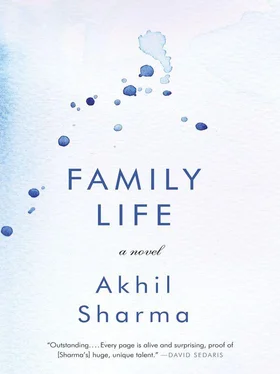Everything about where my grandparents lived was pleasingly miniature. Their lane was so narrow I could reach out and touch the houses on both sides. In the morning, when we arrived, the gutters ran with soapy water and the lane smelled of soap and also of hot oil and dough from the parathas being fried.
My grandfather, seeing us, straightened up from sweeping his small whitewashed courtyard. “Who are these two princes? Are they saints who have come to bless my house?” He wore white pajamas and a homemade sleeveless undershirt with long shoulder straps. I hurried forward and to show that I was good and knew to display respect, touched his feet.
“We have gotten our airplane tickets, nanaji,” Birju said. Hearing this, I wished I had said it so that then I would be the one bringing the news.
“I’m not letting both of you go. One of you I will keep.”
“We’ll miss you,” Birju said, reaching down to touch our grandfather’s feet. He had long, bony arms.
“I will miss you, too,” I murmured, again feeling jealous that Birju had said something that made him look good.
There were small rooms on two sides of the courtyard. These were cool, shadowy places. They smelled of mothballs, and this was pleasant because it suggested closed trunks and things that would be revealed when the seasons changed.
Around eleven that morning, I fell asleep on a cot in one of the rooms. When I woke, Birju was lying next to me, smelling of the coconut oil that my mother put into his hair because of his dandruff. My mother and grandmother were sitting on the floor near the courtyard. They were talking in whispers and making seemi, rubbing wads of dough between their fingers so that the dough became thin as a thread, then pinching off small pieces so that these fell on the towels spread in their laps. The seemi looked like fingernail clippings.
“You don’t speak English,” my grandmother whispered.
“I will learn.”
“You’re almost forty.”
“I’m going for Birju and Ajay.”
“Isn’t it better for them to be here with their whole family?”
“Their father is there.”
“Here you have a job.”
“What is here? Thieves? That Indira woman will eat us.”
I lay on my side and watched and listened. Usually, naps left me melancholy. Lying there, I began to think that when I was in America, I wouldn’t be able to see my grandparents every Sunday. Till then, I had not fully understood that going to America meant leaving India. I had somehow imagined that I would get to have the jet packs and chewing gum that people in America had and also be able to show these things off to my friends.
Soon it was time for lunch. I sat on the floor beside Birju. I broke off pieces of roti and leaned forward so that whatever dripped would fall onto the steel plate before me. The melancholy wouldn’t go away. I couldn’t quite believe that when I left India, my grandparents’ house would continue to exist, that the gutters along the sides of the lane would still run with soapy water.
WE WERE SUPPOSED to leave in early October. In August, this seemed far away. Then September arrived. Every evening I had the sense that the day had rushed by, that I had not done enough and the day had been wasted.
I started to talk in my sleep. Most afternoons when I got home from school, Birju and my mother and I napped on a wide bed in the bedroom. The thick curtains would be pulled shut, the ceiling fan spinning. There would be trays of water on the floor to soften the air. One afternoon, I lay on the bed with my eyes open. I couldn’t move my arms and legs. I was hot, sweating, panicked. I saw ants carrying our television up a wall. I said, “The red ants are carrying away the TV.” Birju was sitting beside me looking down, appearing amused. He seemed more real than the ants.
In school, I started getting into fights. I was in third grade. One afternoon, I was standing in the back of my class, talking with my best friend Hershu and a little Sikh boy whose hair was pulled into a bun under a black cloth. The Sikh boy said, “Americans clean themselves with paper, not water.”
“I know that,” I said. “Say something that other people don’t know.”
“In America they say ‘yeah’ not yes. Mrs. Singh told me to let you know.”
“That’s nothing. On an airplane, the stewardess has to give you whatever you ask for. I’m going to ask for a baby tiger.”
“When you get on the plane, go to the back,” Hershu said. “Go all the way to the back to sit.” Hershu said this softly. He had a large head, which looked too big for his body. “When an aeroplane falls, it falls with its front down.”
“Get away, evil-eyed one,” I exclaimed. I put my hands on Hershu’s chest and shoved. He stumbled back. He stared at me for a moment. His eyes got wet.
“Look,” I called out, “he’s going to cry.”
Hershu turned away and walked to his seat. I couldn’t understand why I had just done this thing.
I CONTINUED GOING TO the milk shop every morning. Because I would be emigrating to America, the milkman did not have me wait in the crowd and instead called me to the front. He probably did this because bestowing attention was one of his few powers.
Once he said, “What will happen to your brother’s bicycle?” The milkman was seventeen or eighteen, and he was in the shop’s entrance, his pajamas rolled up, barefoot because milk inevitably got spilled and it is a sin to step on milk with slippers.
“I don’t know.”
“Tell your mother I would like to buy it.”
As he spoke, I was conscious of all the boys watching. I felt their eyes on the back of my neck like hot sun.
Relatives started coming to the apartment and asking for the things that might be left behind.
One warm night, my father’s younger brother visited. He sat on the sofa in the living room glowering, sweat dripping from his mustache. The ceiling fan spun. He drank several cups of tea. Finally he said, “What are you going to do with the television and refrigerator?”
“Ji, we were planning to sell it,” my mother answered.
“Why? Don’t you have enough money?”
Piece by piece, furniture vanished. The easy chairs disappeared, the daybed was taken away, and the sofa faced a blank wall before it, too, was gone. Laborers, thin as mice, came wearing torn shirts, smelling of dried sweat, sheets wrapped around their waists. One laborer tilted the iron armoire that stood in the living room onto another laborer’s back. The burdened man inched out of the room. The dining table was turned onto its side and carried away. Once the table was gone, there were white scuff marks on the cement floor where it had stood. When even the TV was gone, Birju and I stood in a corner of the empty living room and called out “Oh! Oh!” to stir up echoes.
Near the end of September, Birju convinced me that I was walking and talking in my sleep because I was possessed by a ghost.
This happened late one afternoon. Birju and I had just woken from our nap, and we were sitting on the bed drinking our daily glass of milk with rose syrup. Birju said, “Ajay, don’t tell Mommy this, but you are possessed. When you talk, it isn’t you talking but the ghost.”
“You’re lying. You’re always lying.”
“I talked to the ghost, and he said that he had the gift of prophecy.”
I had always believed that I might possess supernatural powers, like flying or maybe seeing into the future. “You’re lying,” I said, hoping that he was right.
“I asked him what was going to happen to me.” Birju said this and stopped. He looked serious.
“What did the ghost say?”
“He said I’m going to die.”
I stared at my brother. He looked down. He had long eyelashes and narrow shoulders and a narrow chest.
Читать дальше












